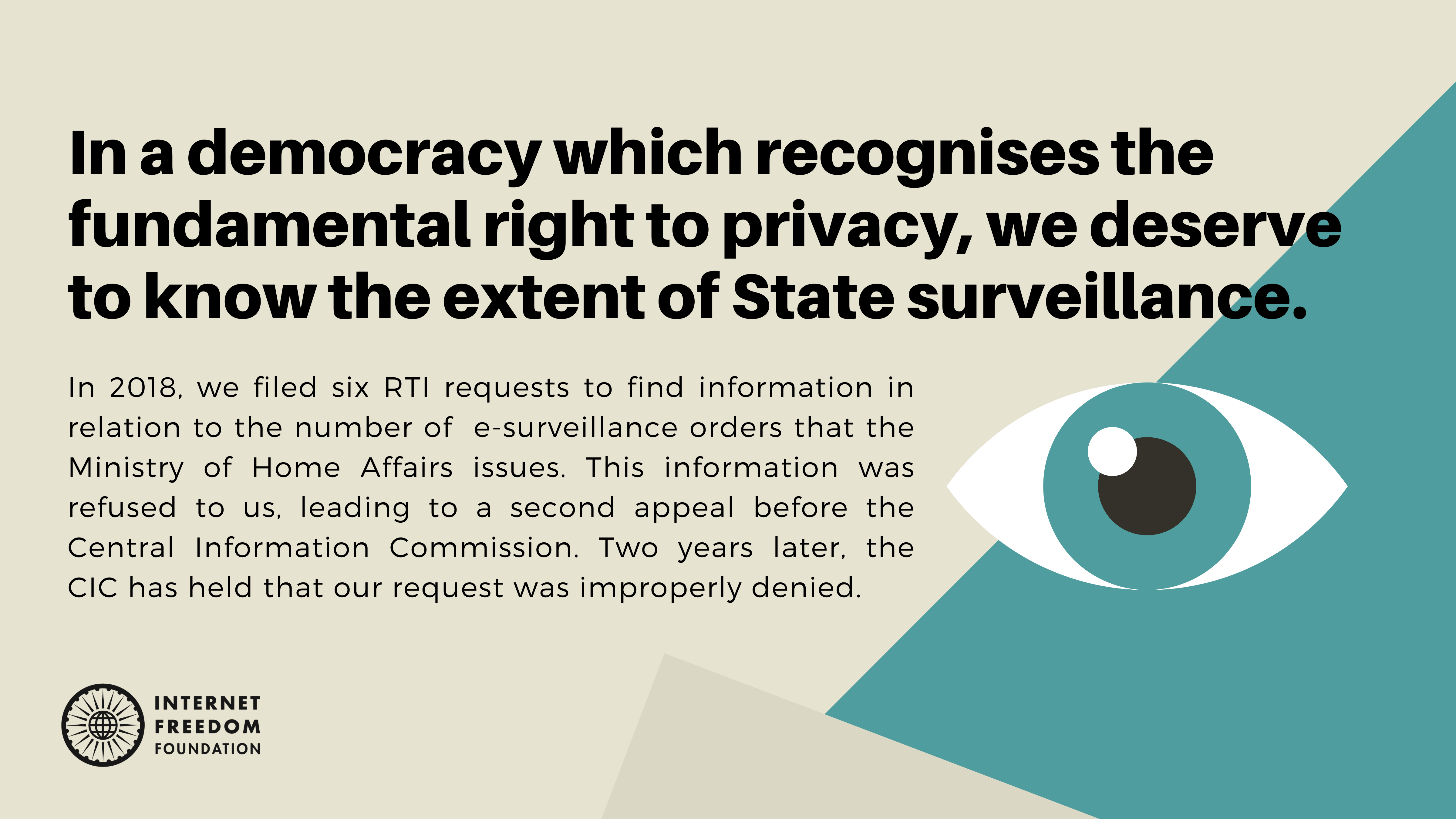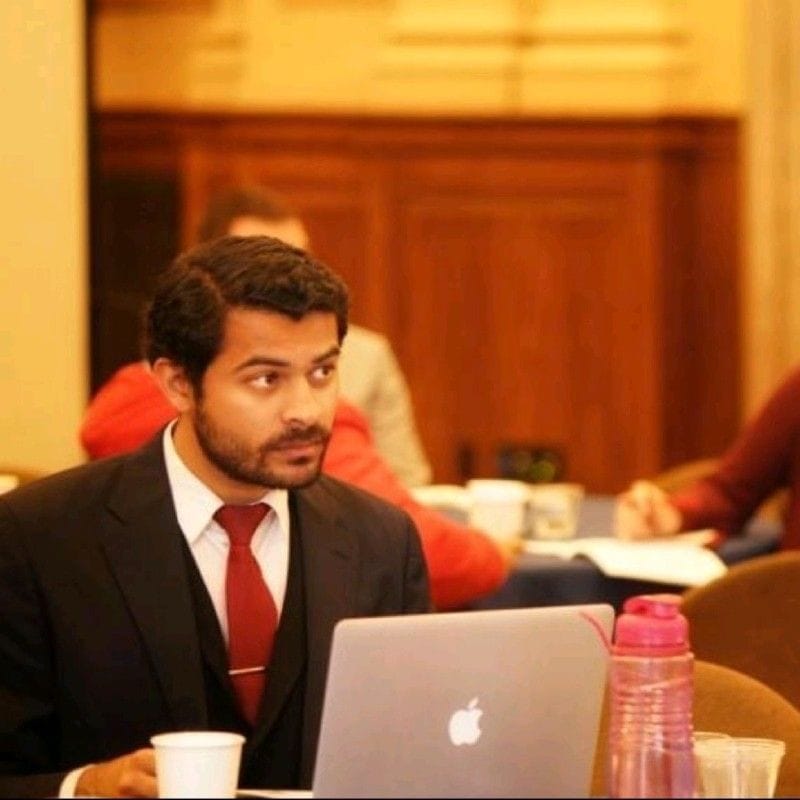
Tl;dr
We filed 6 RTI requests to find out information in relation to the total number of electronic surveillance orders that the Ministry of Home Affairs issues. Such information does not impact national security even remotely and only safeguards the constitutional rights of every Indian. However, this was refused by the MHA leading to a second appeal before the Central Information Commission (CIC). On Monday, after CIC accepted our appeal, it observed that the MHA failed to justify reasons for denial. It also observed that our first appeal to the First Appellate Authority of the MHA was improperly rejected. It remanded the case back to them, and had directed them to re-adjudicate it by July 31, 2021. This is a positive outcome. IFF will consistently and incrementally be pushing for greater transparency and trust for interception and surveillance reforms.
Background
On December 28, 2018, IFF filed six RTI requests seeking statistical information about electronic surveillance orders under S. 69 of the Information Technology Act, 2000. S. 69 is also at the heart of our writ petition demanding judicial oversight in the surveillance process. The information obtained through these RTI applications would support our litigation work, and you can read more about our PIL for surveillance reform here.
Having a meaningful discussion about surveillance is impossible unless there is transparency with regard to the government’s surveillance practices. So how do we fix this problem? The Right to Information Act, 2005 was enacted "in order to promote transparency and accountability in the working of every public authority". Through these RTI requests, we hoped to fill this gap and obtain statistical data which could form the basis of inferring broad operational trends and implementing safeguards for the government’s surveillance practices. Following is an illustrative list of figures sought by us:
- Total number of surveillance orders passed by the Competent Authority.
2. Total number of surveillance requests from law enforcement agencies rejected by the Competent Authority.
3. Total number of surveillance orders passed by the Competent Authority for prevention of any offence affecting the sovereignty or integrity, defense, or security of the State.
4. Total number of surveillance orders passed by the Competent Authority for investigation of any offence.
5. Total number of orders which authorize surveillance for more than 15 days.
6. Total number of surveillance orders which were renewed for a period exceeding 60 days.
The full list of the questions we asked in our RTI Applications is available here. As is clear we are asking for statistical information that in no way, shape, or form hurts national security. It on the contrary strengthens our constitutional rights by ensuring that interception is lawful, proportionate and safeguards are followed.
So, what happened?
Even though we did not ask for details of a specific interception order or a particular individual, and despite our request being limited to anonymous and consolidated figures, the CPIO at the Ministry of Home Affairs refused to provide the information citing various exemptions under Section 8(1) of the Right to Information Act, 2005 (RTI Act). Section 8(1) contains various provisions under which information can be denied to an applicant and contains several grounds in specific sub-sections.
In his response, the CPIO merely stated that disclosure of surveillance related statistics would threaten national security under Section 8(1)(a), endanger the safety of third parties under Section 8(1)(g) and interfere with ongoing investigations under Section 8(1)(h). We failed to understand why it would do either, since all we were asking for was statistical, anonymised and macro information that could better inform evidence lead policy for surveillance reforms. The First Appellate Authority also cursorily rejected our first appeal without explaining how harm would be caused by disclosure of total figures.
Not satisfied with the responses we received from the Ministry of Home Affairs, we decided to file second appeals in these matters and approach the Central Information Commission (CIC), on 6th May, 2019. On 17th May, 2021, nearly exactly two years later, all six of our appeals finally came up for hearing.
National security becomes better with accountability
Before the hearing, we filed additional Written Submissions in all 6 matters, since we had filed the second appeals two years ago. The updated Written Submissions gave us a chance to update the research to include latest judgments, and organise the materials before the Information Commissioner in the order that we intended to argue them.
At the hearing on 17th May, we were represented by Ms. Vrinda Bhandari, Advocate who was assisted by our team of lawyers, Tanmay Singh, Krishnesh Bapat, and Anushka Jain. Ms. Bhandari argued that none of the exemptions claimed by the CPIO, i.e. under Sections 8(1)(a), 8(1)(g) and 8(1)(h) of the RTI Act were applicable, since the RTI requests were only in respect of anonymised, aggregated, statistical data, and not regarding personally identifiable data or data relating to specific orders or persons.
We argued that Section 8(1)(a) of the RTI Act exempts from disclosure such information which would prejudicially affect the sovereignty and integrity of India, the security, strategic, scientific or economic interests of the State, relation with foreign State or lead to incitement of an offence. National security is a serious issue, and we are very cognisant of the concerns surrounding undermining the security of the nation. However, seeking aggregate data of the total number of orders issued does not, and cannot, prejudicially affect any of the above competing interests. We believe that CPIOs must also be careful not to invoke a highly contentious argument of “national security” in cases where it is not relevant. Such tactics may amount to, “crying wolf” and undermine the real issues of national security. It will block honest and open discussions on evidence required for policy and legal reforms that deepen public trust in our public institutions.
We went on to argue that Section 8(1)(g) of the RTI Act exempts from disclosure such information which would endanger the life or physical safety of any person or identify the source of information or assistance given in confidence for law enforcement or security purposes. However, anonymous data which does not contain any personally identifiable information cannot endanger anyone’s life. Again, this ground just like, “national security” seemed to be completely inapplicable, and not even remotely connected to our request for information. This has also been previously held by the CIC in Arun Kumar Prasad vs Bharat Coking Coal Limited (BCCL) [CIC/NCCLD/A/2018/100136]. Similarly, the CIC held that Section 8(1)(h) of the RTI Act, which exempts from disclosure information which would impede the process of investigation or apprehension or prosecution of offenders, is improperly relied on by the CPIO because how can disclosing the total number of investigations, possibly ‘impede the process’ of any ongoing investigations? This was also held by the Delhi High Court in BS Mathur v. Public Information Officer of the Delhi High Court [2011 125 DRJ 508 Del].
We also pointed out that it is well settled in CPIO, Supreme Court of India v. Subhash Chandra Agarwal [(2020) 5 SCC 481] that a CPIO cannot merely reproduce exemption sections from the RTI Act when declining to provide information pursuant to a request. They must provide extensive written reasons for why any such exemption cited is justified. The burden of proof is on the CPIO to show why requested information cannot be provided under S. 19(5) of the RTI Act. It should not be up to the applicant to show why information can be provided. It is already the applicant’s right to receive information under the RTI Act, unless an exemption under the Act justifiably applies. On the basis of these, and other, arguments, we requested the CIC to issue appropriate directions to CPIO to provide the information requested in the RTI Applications.
CIC’s Accepts our appeal. Directs MHA to properly adjudicate our RTI.
On 18.05.2021, the CIC pronounced a common final order for each of the six appeals. In its order, the CIC noted that he heard both parties at length, and found that he is not convinced with the justification provided by the Respondent for denial of information. It was held that the CPIO claimed exemptions under Section 8(1)(a), (g) and (h) of the RTI Act without establishing any connection between the exemption sections and our request for information. He went on to hold that the First Appellate Authority (FAA) has also not decided the cases at hand with due diligence and summarily disposed of the appeals, without dealing with the facts in any detail. Accordingly, the matter has been remanded to the FAA for a proper adjudication this time. The CPIO has been directed to submit a copy of the FAA’s revised order before the Commission by 31st July, 2021.
Privacy and transparency must be seen together
In a democracy which recognises the fundamental right to privacy as held in K.S Puttaswamy v. Union of India [(2017) 10 SCC 1], we must know the extent to which the State undertakes electronic surveillance activities. Privacy for citizens can only be guaranteed by guaranteeing transparency from the State. Privacy and transparency must be seen together and cannot be separated from each other.
In that context, this is a welcome order, because the CIC has taken cognisance of the unjustified reluctance on part of the CPIO in disclosing necessary information to us. The CIC has also set clear timelines for when the FAA must dispose of our matter before him, and sought a status report by July 31, 2021.
We will keep you updated on the status of this case before the FAA. We intend to pursue this information until we receive it, because it is crucial for the safety and privacy of our citizens, and it is a major step in advancing transparency on part of the state’s security agencies.
Important Documents
- Order of the CIC dated May 17, 2021 (link)
- Written Submissions in one of the six appeals (our arguments and grounds in all six appeals were the same, since the denial of information by the CPIO was on exactly same grounds) (link)
- A table containing all the questions and the information we sought in the RTI Applications (link)
- Previous blogpost “We won’t give up! IFF approaches CIC against MHA’s refusal to disclose surveillance figures.” dated 14th May, 2019 (link)
- Previous blogpost “TOP SECRET: MHA Refuses to reveal total number of snooping requests” dated 6th February, 2019 (link)

